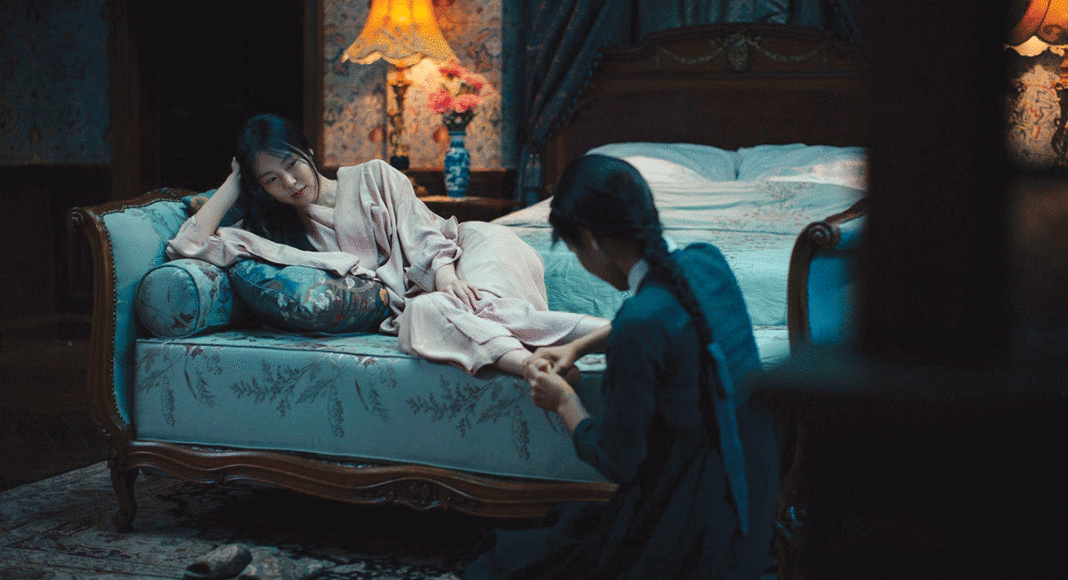It may seem like an odd collaboration: bad-boy Korean filmmaker Chan-wook Park, famed for the violent male revenge melodrama Oldboy, and British author Sarah Waters, whose erotic thrillers are set in the Dickensian underworld of Victorian London. But it turns out to be a surprisingly happy matchup in The Handmaiden, Park’s Asian riff on Waters’ novel Fingersmith. Filmmaker and source material are both edgy in complementary ways. Gorgeously shot and composed, audacious, and full of witty visual asides, The Handmaiden is a sly entertainment of sex, larceny, deception, double-crosses, and female liberation.
Park shifts the locale to Japanese-occupied Korea in the 1930s. Sook-Hee (bright and lively Kim Tae-ri) is a young woman who’s grown up in a den of pickpockets and thieves, purchased from a “purveyor of stolen girls.” One of the gang leaders, a smooth-talking Korean who calls himself Count Fujiwara (Jung-woo Ha), picks Sook-Hee as his accomplice in an elaborate swindle.
The mark is Kouzuki (Jin-woo Jo), a wealthy, middle-aged Japanese man living in splendor at a remote country estate. Kouzuki has been the guardian of his niece, Hideko—and her fortune—since she was 5 years old. Now that Hideko (Min-hee Kim) is a poised young woman, the Count, a talented art forger, has secured himself a position as her drawing tutor. He’s also arranged employment for Sook-Hee as Lady Hideko’s handmaiden. The plan is for Sook-Hee to assist the Count in persuading Hideko to run away with him. Once married, he’ll shut her up in a madhouse and claim her fortune for himself.
Hoping to make her own fortune from her share of the take, Sook-Hee agrees. Street-smart, but not especially sophisticated (she can’t read), she’s awed by Kouzuki’s grand home; half English Gothic, half-Japanese, with an immense library of rare books that she’s forbidden to enter, and the beauty of her new mistress—who’s surprisingly close to her own age. Sook-Hee feels protective of Hideko, whom she considers an unworldly hothouse flower, and Hideko teaches Sook-Hee to read. Sook-Hee begins to feel twinges of remorse when the Count arrives, but not enough to deviate from their plan.
This is just the jumping-off point for a plot that becomes more bold, twisty, and rewarding as it unfolds. Our shifting perception of the characters’ relationships to each other comes into play, along with the nature of those books that Hideko is required to read aloud to her uncle and his frequent gentlemen callers. (Park’s film could be a subversive co-bill with Miss Hokusai: both include the famed ukiyo-e print of a giant octopus pleasuring a swoony geisha, an image Park also references in one funny, fleeting visual gag.)
You might want to skip this one if onscreen sex makes you uncomfortable. A less adventurous filmmaker might have cut some scenes shorter in the interest of discretion. But discreet filmmaking would miss the point of these scenes in all their stark, luscious abandon, as crucial to the storyline as they are, and shot from such interesting angles. The point is not only that the characters enjoy a sexual romp, but that it turns out to be a life-changing experience for both of them that also alters the direction of the plot. Park is canny enough to only reveal glimpses here and there as this intricate puzzle-box of a movie unfolds, saving the extended sequence for about three-quarters into the story, when it has the most impact.
But there’s a lot more going on here than sex. The movie is divided into three parts, containing flashbacks as well as overlapping scenes replayed from different viewpoints, a trail of celluloid bread crumbs to help viewers navigate the labyrinth of the plot. Less violent than we usually expect from Park (although there will be blood), but no less wry and moral a worldview—in its perverse way—The Handmaiden considers colonial and gender politics with wicked aplomb.
THE HANDMAIDEN
***1/2(out of four)
With Kim Tae-ri, Min-hee-Kim, and Jung-woo Ha. Written by Seo-Kyung Chung and Chan-wook Park. Inspired by the novel Fingersmith, by Sarah Waters. Directed by Chan-wook Park. Rated R. 144 minutes. In Korean and Japanese with English subtitles.












